#AoT Analysis
Text
I haven't seen this mentioned yet, but can we talk about Eren's Founding Titan? Specially it's eyes

They're murky and grey-ish, as if he's blind. His usual vibrant green has been dimmed with a milky film. There's so much symbolism in this, in Eren being unseeing, his vision clouded.
He's not present in the moment, can't bare to witness the destruction he's unleashing upon the world. The blood and gore, the unimaginable amount of death beneath his feet. Despite this being his intention, an inevitable immutable future in his eyes, he can't, won't watch.
Armin's colossal form doesn't have ears, so he doesn't have to hear the screams his destruction causes. In this vein, Eren's Founder is blind, purposefully entrapping himself within his own mind. His mind has even reverted to a childlike state in order to cope. Eren talks about freedom, but, surrounded by the colossal titans, he never truly leaves the walls. He just brings them with him.
#aot spoilers#eren jaeger#attack on titan spoilers#just a random eren analysis i've had in my head since i saw the episode#tried to not mention manga spoilers at all#attack on titan#aot#aot analysis
2K notes
·
View notes
Text
Why Levi and Petra?
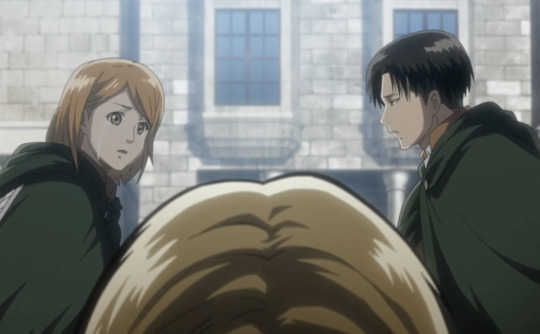
Of course, upon general viewing of SNK and its characters, it's clear that they have established Erwin, Levi, and Hange as the leading trio of the Survey Corps. They represent this faction of the military and in interesting ways, mirror the main protagonists of the series.
While there is a lot to be said and appreciated about Levi's relationships with Erwin and Hange, I have come to find that the character who humanizes him is the lovely (albeit forgettable) Petra Ral.
Early in the series, we are introduced to Levi as Humanity's Strongest Soldier. Erwin makes use of his abilities in this sense, and Hange often relies on his strength in combat as well. That is not to say this is the extent of their relationships: we have Levi's iconic "Give up on your dreams and die" scene with Erwin (S3 E16) and the infamous "Maybe we should just live here [away from my responsibilities] together" request from Hange (S4.2 E8). However, something to note with both scenes is that while they give depth to Levi's relationship with both characters, he essentially serves to highlight others. In the former, Levi's response directly challenges Erwin's dream, and allows this commander a defining moment of growth. Similarly in the latter, Levi is used as a means for Hange to express and eventually overcome their fears and insecurities about the deal they've been dealt as the new Commander of the Survey Corps (which at the time was rapidly disbanding under the Jaegerist movement).
In other words, Levi is the "subplot character" to Erwin's and Hange's individual arcs. (According to John Truby, 'The subplot character… provides another opportunity to define the hero through comparison and advance the plot.')
Which begs the question… at what point in the series, if any, is Levi defined as a character in and of himself?
Two prominent scenes from season 1 come to mind, which are namely: 1) The dying soldier scene (S1 E9), and 2) Petra's conversation with Eren in headquarters (S1 E15).
In the first, Levi comforts a dying soldier and vows to carry on their will and exterminate all Titans. When the soldier passes before he can reply to Levi's words, Levi turns to his fellow soldier Petra and asks her if he was heard. Petra provides confirmation, emphasizing the peaceful expression on the soldier's face.
In the second, Petra confronts a gloomy-looking Eren, who has been tasked to clean headquarters along with the rest of the Special Operations Squad (aka the Levi Squad). She specifically points out how Levi is 'not the hero he's expected to be' in the sense that he has a terrible personality, though she does so while smiling almost fondly, as though it doesn't matter what his personality is because they can always put faith in him as their Captain. It seems she wants Eren to understand this - or a notion similar.
It is in both moments that we are able to clearly see Levi beyond being a powerful soldier. Always, he is a threat. When he enters the scene we expect the shift in the dynamic of the battle - we expect him to win. He's a trump card. Erwin's last words to him are an order (S3 E16), and Hange's last words about him is "he's [Armin's] underling now, so really put him to work" (S4.3.1). Levi acknowledges Erwin's and Hange's humanity, bolsters it even, with the conviction of "dedicating your heart". In SNK he is the symbolism, the embodiment, of a soldier. That's all he really ever gets to be. Even his softest moments with - heck, anyone in the series - are meant to deeply reflect on the guilt, the burden, the purpose of getting the job done. ("So… you're telling me… I've spent all this time and energy running around killing people?" (S2 E12) / "Just think, if your hands were still clean... Jean wouldn't be here right now." (S3 E2) / "If we just run away and keep on hiding, what will we have left?" (S4.2 E8))
But for those singular moments in season one, he's more than just the threat. We see him as a human not only with (personality) flaws, but also with dreams and convictions, tied so seamlessly with his comrades' cause that we are reminded painfully, at the end of the series, that it was Levi who carried them all to the end. Throughout the story we see Levi lament fallen soldiers; we are exposed to how much he empathizes with his comrades and their deaths, to the point where it can be said that no one keeps us more aware of the lives that have been lost throughout the show more than Levi himself.
In this manner, Petra was the subplot character to Levi's hero. She gave the audience a (subconscious) glimpse of the Humanity within "Humanity's Strongest" and built the bridge that would lead us to compelling and important revelations about Levi's thoughts and actions as the show progressed. It's Petra whom he finds tending to a dying soldier; Petra whom he asks for confirmation that the soldier heard; Petra who, against all expectation, asks Eren to see past the station, the status, the soldier, to the person himself.
"He's not quite the great, perfect hero society makes him out to be, huh? The real Captain Levi is shorter than you'd expect, temperamental, crude, and unsociable. (…) You thought that because he's skilled, he doesn’t have to follow the rules like everyone else?" (S1 E15)
It's even Petra who, despite her rank, asks Levi to step aside when Eren becomes a half-baked Titan. Here, Levi's robust intuition and split-second decision making skills are shown even away from the battlefield. It's Petra who leads the Special Operations Squad in their apology to Eren (S1E19 "Bite"), who first instills in us (narratively) the notion of trusting your fellow comrades. More specifically, she is who convinces Eren to place his life in their hands. It's this notion that Levi carries with him even until the final arc - "I've saved Eren countless times over - each time, more comrades dying. All because I believed he was the hope of humanity." (S4.1 E13) In the manga (Ch112), it's Petra we see at the forefront of this belief.

"Do you, Eren? Do you find it that hard to trust us?" It's Petra who dies, her words the final say in convincing Eren: "I believe my squad will be victorious." (S1 E21)
"It's like some awful joke," Levi reflects later on, as his comrades' dying hopes and dreams flash by in the canopy of the forest. "What the hell was the hope that we saw? Such bullshit. It's not even funny." (S4.1 E13) "We" here could definitely mean the soldiers who've given their hearts, but the metaphorical representative of this heart is Petra herself... "Eren! Trust us." (S1 E19)
And in the end, it's Petra in the forefront alongside Erwin and Hange, representative of her fellow soldiers, the one (experienced/veteran) Scout we've seen and interacted with in the entire series to have professed the values of hope, of trust, of belief, which is henceforth carried on by Levi himself, his own convictions, his own dreams. They are, in the entire series, the glimpse we get into the Scout Regiment beyond the series' titular character and his comrades in the 104th, and a thorough dive into what makes Levi Humanity's, not simply its strongest.
Her character song, "The Light of Dual Wings", can literally be taken as an allegory of the dreams the Scouts have entrusted to Levi. That's how prominent she is as a Scout; how coded her devotion to Levi is, whether interpreted platonically, romantically, or narratively, as the dedication of hearts.
So, yes, I love them together. I love their scenes, the implications of them narratively, the values Petra professes so effortlessly in the air, washed away by the higher tides of the Female Titan arc. I love that it's still Petra at the forefront, in all of Levi's reflections moving forward, because she is our first glimpse into Levi's character, the real him.
In the end this is just a ship post struggling to keep from delving too much into the symbolism of Levi and the Scouts (how Levi is the face of the Scouts more so than Erwin himself, really), the truest depiction of humanity's collective fight for freedom in this entire series. In his early days, Eren wanted to be a Scout, after all. It is Levi and Petra who push him forward into 'that hell' - for better and worse, respectively.
#levi ackerman#petra ral#rivetra#levi x petra#levipet#aot#snk#attack on titan#shingeki no kyojin#levi character analysis#levi petra relationship analysis#aot analysis#snk analysis#i even cited episode numbers!#i was too lazy to get the overall episode number though xd#so you get dumb citations like S4.3.1 lol#analysis.vtf
243 notes
·
View notes
Text
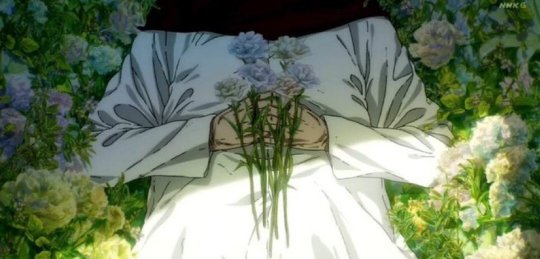
Was she buried under the tree alongside the love of her life? Please. 😭 💔
I remember this scene being shown in the manga, but she was amongst the white roses. Glad they decided to change it like that. 💔
#attack on titan mikasa#mikasa#eren x mikasa#eremika#mikasa ackerman#shingeki no kyoujin#snk#snk final season#shingeki#shingeki no kyojin#thank you isayama#attack on titan#attack on titan the final season#aot#aot analysis#aot anime#aot angst#under the tree
241 notes
·
View notes
Text
i think a very interesting thing i’ve noticed is how many of the main characters symbolize a theme or idea in aot, sometimes in a more complex fashion sometimes not.
anyway, levi being the embodiment of the resilience and kindness that humanity is capable of. similar to eren, i think levi and jean have a specific dynamic that is fitting when i think about what ideas they mean to represent.
if levi is a pillar to the best and brightest of the human condition, then jean is a symbol of humanity itself. he antagonized eren for a long time out of selfishness, before in his suffering coming to reluctantly give eren a chance to prove himself. jean repeatedly says that if victory costs so many innocent lives, maybe they don’t deserve to win. during the rumbling, much like humanity literally, he’s afraid; almost too afraid to fight at all. jean is very human, but it seems that whatever state his character is in really resembles the climate of everyone else at any given time.
whichhh makes jean and levi’s dynamic interesting. after jean kills someone to protect armin (the embodiment of hope, in my opinion...) and he’s feeling guilty, levi pretty much counsels him to accept the person he’s become. in season 1 when jean is beating annie’s crystal with broken odm swords, levi stops him (gently) and convinces him it’s pointless. both then as well and during the rumbling, levi is there to protect jean from direct physical harm. the idea of the best humanity is and has to offer protecting humanity itself is really beautiful.
maybe it’s a reach but i see it :’)

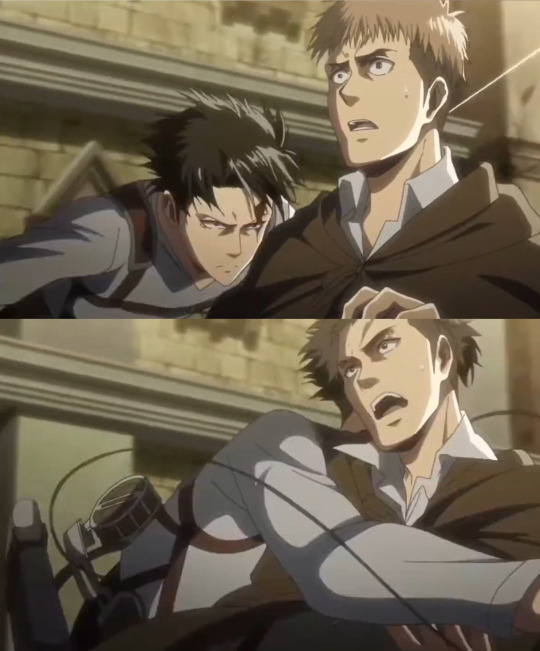

#aot#snk#attack on titan#jean kirstein#levi ackerman#levi aot#snk meta#aot analysis#jean aot#aot meta
68 notes
·
View notes
Text
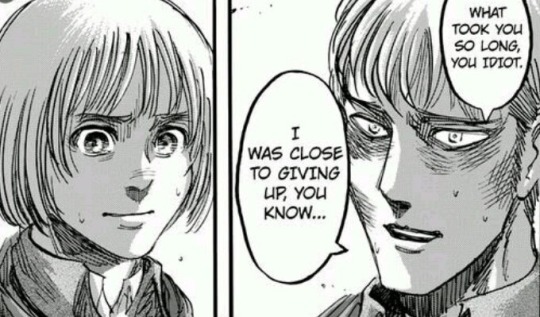
Sometimes I think about how Armin was originally part of Jean’s character in the early versions and I wonder how different things would have been if they hadn’t been separated… Armin is such an important character. The story depends on him heavily.
Looking at them now, I think it’s no coincidence that these characters have such an impact on the growth and survival of the other.
That Jean pushes Armin through his fear of making hard decisions in the heat of the moment.
That Armin saves Jean by confronting this fear and committing to his choices.
Armin has always been determined to stand up to others, so not to be seen as weak, but the fight with himself is what challenges him the most. I think it’s kind of cool that Jean, the character he was born from, gives him strength to tap into his own power. It feels symbolic.
I could go on and on about these two, but maybe another day…
#attack on titan#shingeki no kyojin#aot analysis#armin arlert#jean kirstein#jearmin#armin analysis#Jean analysis
68 notes
·
View notes
Text
Armin’s character and what he represents about bravery within the story means so much to me.
I feel like so often in shonen and general action story media traits like ‘bravery’ and ‘courage’ are considered synonymous with strength or risk-taking- and that’s certainly accurate in a lot of cases. But just like in so many other ways, AOT subverts or critically examines this trope within its characters- particularly in the main trio of the cast.
It’s so easy to reduce Armin to his easiest defined trope- the smart one- and while that’s definitely true and you could write a million meta essays on his intelligence, strategic thinking, etc, I think we don’t talk enough about the ways Armin’s character begs the audience to reexamine what it means to have strength and bravery.
Armin’s strength is not in the physical realm (although it’s worth dedicating another post entirely to the fact that Armin is certainly not that weak either- simply the weakest of an already exceptional group) and his strength is not solely his mind either. But also his determination, conviction, and the way he is willing to sacrifice himself to save others with hardly a second thought- all while not being as rash as Eren and Mikasa can be.
In a recent rewatch of the Trost Arc, there were so many moments that stood out to me that I had previously either taken for granted or not noticed the significance of. In that arc alone, after Eren’s “death” -
He follows Mikasa without hesitation to rescue her when she runs out of gas
Offers Mikasa his gas canisters and blades knowing he won’t survive without them
Defends Eren to the Garrison (this is obviously a pretty big moment that isn’t usually overlooked, of course)
Rushes off from the decoy squad and runs the ENTIRE length of the Trost district wall when he sees the red smoke flair- just to be there to help Mikasa and Eren
Stays by Eren’s titan form on foot in a titan infested area right before he places the boulder
And there’s probably some more I missed.
Armin at this point in the story has no false confidence about his ability to survive- in fact he probably has an abysmal lack of confidence that he can’t affect much, but he does it anyway.
(Obviously, this self-sacrificial tendency reaches a head and ultimately culminates in the sacrifice of his life in the mission to retake Shiganshina…)
All of this to say, what Armin represents about bravery and courage is so important to me because he dedicates his life with the purest of intentions- he is not scared of death in such a noble way and he brings it up again and again. He would die for the cause- nearly does.
Which I think creates an interesting parallel between him and Eren in the sense that Eren is frequently referred to as a “suicidal maniac”- clearly meant to refer to the reckless way he rushes into danger. Whereas Armin’s instinct towards self-sacrifice is never viewed this way, because it’s not a glaring flaw in the same way that Eren’s behavior is.
Another way the story examines this is through his interactions with Annie- who is opposite in that she is fiercely dedicated to her own survival at any cost. This is brought up in their interaction during the ODM gear inspection when she asks him if he would die if someone ordered him to and he easily answered that he would. Armin’s ability to understand this difference between himself and Annie without judging her for it is also unique to him.
Because Armin doesn’t expect anyone else to give their life or view others as cowards for not rushing into danger- because he sees the value in every life. He just feels the cost of his own life would be worth it to preserve someone else’s. It’s this love for humanity and unwavering optimism at the core of his character that gives him so much conviction.
And like so many others have pointed out, this is what saves him (and, to an extent, later the world) in the end when it comes to Levi’s choice to revive him. Erwin was successful because he was able to set aside his humanity and sent countless soldiers to their deaths to gain victory. Armin, more than anyone else in the story, was able to plan and make a difference in such a way that always assumed he would either ask others to take an equal risk or put himself at more risk to reach the goal. And he wasn’t driven by anger, hatred, or rage to do it.
Clearly, there’s a lot that can be said about the way Armin shows strength and bravery in dire situations without being, stereotypically, the strongest character- or even the die-hard risk taking typical protagonist that Eren represents for most of the story.
But I think ultimately the story is trying to show us that Armin’s version is the version that is within reach for everyone- and that will make the biggest difference in not just winning a battle but in making a better world. And it’s so important to me that AOT- despite being such an inherently violent story- took the time to present that message as emphatically as it did.
#armin arlert#eren yeager#annie leonhart#levi ackerman#erwin smith#aot meta#aot analysis#long post#character analysis#this is the result of three days of brainrot rattling my skull#armin is best boy material but like in a viscerally literary way okay?
67 notes
·
View notes
Text
A few months back I chose to write my final critical analysis paper in my written communications class on Attack on Titan. I would like to rewrite parts of it and then release the full thing, but for now I figured I would share the part I wrote for theme. The theme is chose to focus on for this paper was the cyclical nature of violence and how it is shown in the story. Please enjoy 😊 🙏
While Attack on Titan presents many themes throughout its run, one of the most prominent in the final season is on the cyclical nature of violence and how it does no good as it goes on. The war between Marley and Paradis has been going on for two thousand years, and the people alive in the world today have only known this war, not even having a true answer to what started the war to begin with. A great example of how the cycle of violence affects the people within it is again found in the character Gabi. A child soldier, Gabi has known nothing but the war her entire life. Because of the propaganda promoted by the country, she views the inhabitants of Paradis as inherently evil. This, combined with Eren’s attack on her home, are what lead her to climbing aboard the airship and killing a soldier. When she gets to Paradis and is imprisoned, she continues to act recklessly and even kills her guard to escape the prison. It is then she is mistaken for an orphan and taken in by none other than the parents of the girl she had killed. They have no knowledge of who she actually is, but are immediately willing to show her kindness and take her in. When they learn who she actually is, the family turns against her, and it is suggested that the soldier’s father kills her to balance out the death of his daughter. He refuses, though. He speaks of raising his daughter, teaching her to protect herself in the woods where they lived and raised her. Using the forest as a metaphor for the cycle of violence, he explains further. When she went off to join the military, she only traded her home for a bigger forest. She only died because she wandered in the forest for too long, staying in the army she was bound to die, but she knew no other life. Gabi has also been raised in the forest so to speak. She has grown up in this war and has known nothing but violence, which has led her to being in this situation at such a young age, having no experience to know any better. The father addresses the other adults around him, stating that as the adults, as the ones who know how to do better, it is their job to lead the lost children out of the forest, and show them the truth behind the violence they have always known. It is his words, his explanation and his willingness to accept her actions, as well as the acceptance of the rest of the family that leads Gabi to seeing the truth of the world. She realizes that Eldians are not inherently evil, and that neither of the perspectives she was fed are particularly correct. After this she becomes significantly less recklessly violent, and begins to actually fight for what she, not her country, thinks is right--an end to the war on both sides. The show not only focuses on the cyclical nature of war and its effects, but also encourages the idea of one day being able to escape it.
46 notes
·
View notes
Text
The Importance of Compassion over Ideology: Levi's Choice as an Act of Mercy and Human Decency
I think one of the most important things that gets lost is all of the discourse, all of the arguing over Levi's choice to let Erwin rest, and whether or not it was the "right" thing to do, is what an incredible act of human compassion, kindness and empathy it was.
One of the main themes of "Attack on Titan" is the danger of ideology and how easily we can lose our humanity to concepts of "the greater good".
All of the arguing within the fandom itself over this particular moment in the story is, in many ways, a manifestation of that. A loss of human compassion, a loss of kindness and mercy to an abstract notion of ideology. Many fans are guilty of just this thing, in their enraged condemnation of Levi's choice. Whether they know it or not, they expose a lack in themselves of human empathy, or even sympathy when they criticize Levi's decision to let Erwin die. To them, the "greater good", that vague, undefined, uncertain promise of something "better" is more important to them than the immediate, concrete and tangible suffering of a fellow human being.
Floch himself is a sort of stand-in for that portion of the audience which so harshly criticizes Levi's choice. And Floch is also an exemplar of what happens, when we place ideology over human compassion. You become a radical extremist, willing to justify any act of atrocity in the name of "the greater good".
Levi is Floch's perfect opposite. His perfect foil. Because we see him make a decision which rejects Floch's brand of justified atrocities, by placing an act of human compassion, kindness and empathy above the vague, undefined and uncertain ideology of the greater good.
And what better person to demonstrate the importance of retaining our humanity in the face of and against ideology, than the most kind, compassionate and empathetic character in the whole series?
Despite what Levi says about himself, about becoming a "monster" that hurts people, his actions belie that self-assessment. Because he not only refused to lose his own humanity to ideology, but also, he refused to let Erwin lose his.
Because ideology, and "the greater good", mean nothing if, in the pursuit of those things, we lose all sense of human decency. If we become monsters. If we lose our compassion, and our empathy toward the suffering of others. If we lose our mercy.
Levi's choice in Shinganshina was really an act of rebellion against the cruelty of ideology; a defiance against the belief of "the greater good" above all else. It was a statement declaring that, no, the greater good doesn't always take precedence, isn't always the most pertinent or important objective. Sometimes, a simple act of mercy is more important. Sometimes, to show compassion toward another human beings suffering is the only path toward an ideal world.
Levi really encapsulate that theme, then, of humanity first, of humaneness first, above the doctrine of movements.
There is no greater good, after all, without compassion and empathy. There is no "better tomorrow" without human kindness.
#Levi Ackerman#Erwin Smith#attack on titan#shingkei no kyojin#meta#commentary#analysis#aot analysis#aot meta
97 notes
·
View notes
Text
The only thing I dislike about Eren's death is that he's always felt trapped, and in the end his only freedom was death. Like, that's depressing as hell for any person that could feel similarly...

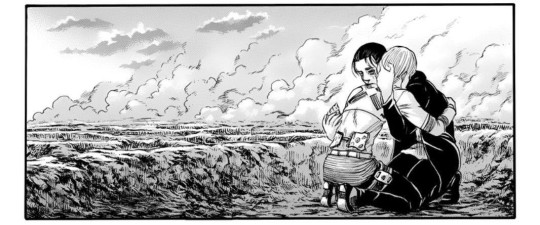
#cl thoughts#very poetic narratively#and he didn't “deserve” to live after what he did#but :/#eren jaeger#eren yeager#aot#eren analysis#eremin#attack on titan#aot finale#erearu#shingeki no kyojin#snk#aot analysis#attack on titan the final season#aot spoilers#jlmfr
68 notes
·
View notes
Text
So I saw someone point it out somewhere, but I cannot remember where and who (I think tiktok maybe?), but apparently in the 2nd opening there's yet another easter egg, and I just had to check it out for myself
And it's actually true!
So in S01E19 Levi's OG squad bites their hands to show remorse for not trusting Eren after his accidental transformation

Yeah, so in the 2nd opening, they actually show Petra having the bite marks!!!
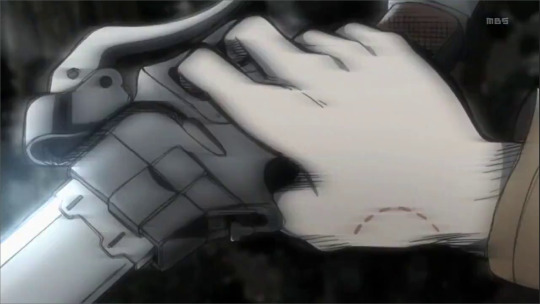
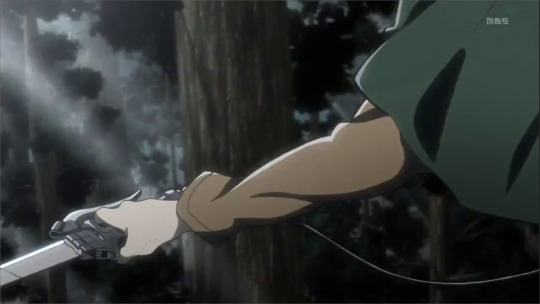
Which is yet another example of how fucking amazing and detailed the OPs and EDs are and how many things are hidden in plain sight unless you go crazy and watch them frame by frame (which I will do soon for the analysis I'm working on)
#interesting stuff#I love all the OPs and EDs#and foreshadowing and easter eggs in them#attack on titan#shingeki no kyojin#aot#snk#aot analysis#my ramblings#petra ral
32 notes
·
View notes
Text
Can we talk for a second about how Levi always refers to the members of his squad by their first name. In Japan, referring to someone by their first name is significant. Its more typical to refer to someone by their family name if you don't know them all to well. Close friends even still use honorifics, such as [Name]-chan. There's several instances where Erwin refers to the newer cadets by just their last names, which is typical in a military setting even in other countries, but Levi calls the 104th kids by their names, Armin, Jean, etc.
Levi obviously doesn't care for honorifics or typical social niceties -they didn't really matter where he grew up anyways- but to me him referring to them by their first names -even as they call him Captain (heichou)- means 'we are equals, I trust you'
374 notes
·
View notes
Text
I'm sure I'm in the minority on this.....
But with everything we now know about Eren after the manga and anime finales, primarily the fact that he engineered Carla's death to further his own ends, I think that makes Attack on Titan infinitely more unwatchable with that knowledge in mind.
The whole thing has been built on Eren avenging his mother and his people by wiping out the Titans. To know everything in the series was all something beholden to his design including the explicit revelation that Bertolt only survived the fall of Shiganshina because Eren decided it wasn't his time to die.....it's an infinitely more damaging revelation than his pathetic confession of his feelings for Mikasa.
"Sasha and Hange died because of me...." Right, so apparently any deviance in the time loop that might've guaranteed their survival was a roadblock to his plans even after he hsd fully committed himself yobtbe Rumbling, his plan was really that precise and to the letter? What if Connie and Jean died or what if Marco lived, like the implications here are utterly baffling and repulsive. Guy who was so dead set on saving his friends couldn't make room for those girls huh? I call bullshit.
So thoroughly turning Eren's motivation inside out like this is a decision not enough people are picking apart, not enough people are really looking at the logistics of any of this or considering how much you gotta suspend disbelief in order for this to make any sense.
And I was at Awesome Con just a week ago, Bryce Papenbrook was right there a hundred feet away. I just missed my chance to get his two cents on this. I can only hope for better luck next time.
Sadly though I don't think I can look at the first three seasons again because of how thoroughly tainted they now are because of the final season.....I would have preferred Eren was a straightforward villain from the start because this is truly Isayama's greatest betrayal. (Second in my book, right after you know what....)
#attack on titan#shingeki no kyojin#eren yeager#eren jeager#eren x mikasa#eren jaeger#mikasa x eren#eren#fuck eren#fuck attack on titan#fuck isayama#anti hajime isayama#hajime isayama#i hate eren#i hate everything#snk anime#aot anime#snk manga#manga art#snk angst#aot angst#snk analysis#aot analysis#i hate isayama#mikasa ackerman#armin arlert#snk spoilers#levi ackerman#aot spoilers#anti snk 139
29 notes
·
View notes
Text
There is something so appealing about season 4 Hange.
Like I mean yes, I fell in love with their character practically within moments of meeting them. Seeing them so full of life and comedic in such an unforgiving world as AOT was such a needed breath of fresh air. I think Hange’s character really balances that aspect out and it really draws you into them. Especially their other characteristics; their determination to lead; consistently following their morals; and their want to uncover the secrets of the world they were born into. But when Hange was given their new role as being the commander, their character takes such a drastic change.
They become riddled with the idea of living up to high expectations as a leader like Erwin, but still they continuously accept their responsibilities as commander and took accountability in areas where they felt like they had failed as a leader. They were someone everyone looked towards for the answers. And all through that noise and dreadful thinking, they kept persevering through their depression, their guilt, and their emotionally draining position as commander. As much as it kills me to see Hange unhappy, the added depth to their character and how they develop after Erwin’s death just really excelled my love for them. There is something so raw and genuine about their character I can’t quite describe.
There are so many nuances to their character and I truly do love to pick them apart and dive into their thoughts. Because I think many people can see themselves in Hange - someone who is so weighed down by other peoples expectations that it becomes so draining to keep on going. Some persevere, and some don’t, but Hange did. They followed their morals until the bitter end and held what they believed to be most important close to their heart, they sacrificed their life for their comrades to survive and to uphold their responsibility as commander, and they continuously fought an up hill battle against their burdens and other peoples expectations. Now that is truly inspiring.
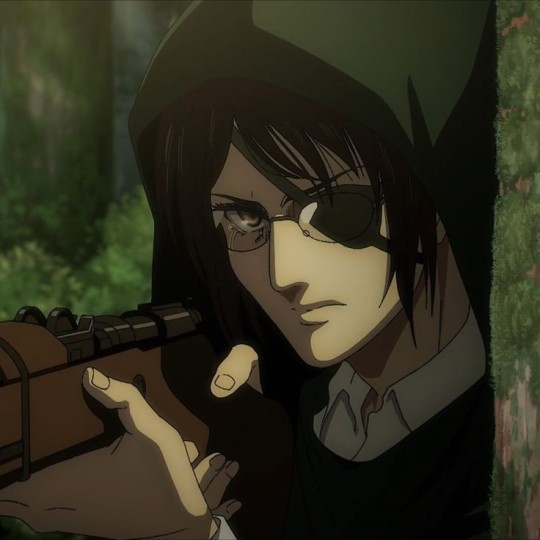
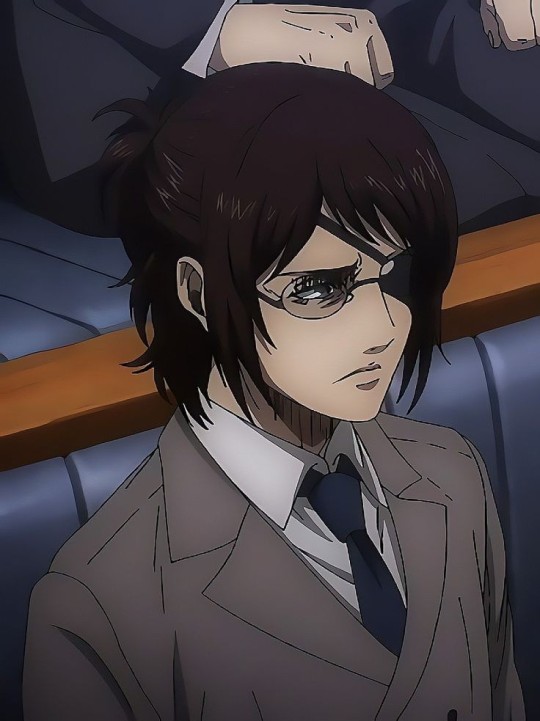

#aot#discussion#aot analysis#hange zoe#character analysis#there is a reason they are my favourite character
139 notes
·
View notes
Note
You said you could write an essay on S3 Eruri poster, DO IT 👁️ 👁️
THANK YOU FOR ENABLING ME😩BTW TELL ME HOW I WROTE A 7 PAGE ESSAY ABOUT ERURI IN LIKE 2 HOURS BUT MY ACADEMIC LIFE IS SUFFERING😭 | 2.2k
alright. (here it is in the best quality i could find:)
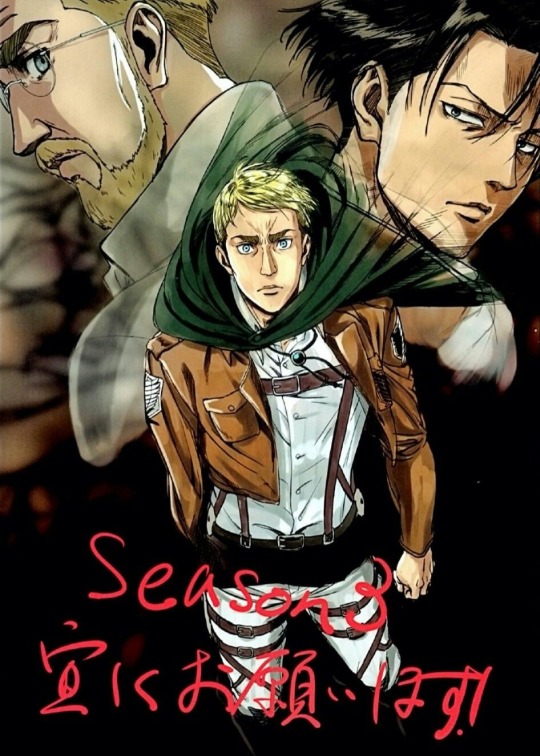
this image was a promo for season 3. i believe it refers to both part 1 and part 2, even though Erwin’s major character arc is finished in part 2.
first of all, before dissecting the image i'm going to lay out all the puzzle pieces needed for us to do that. let’s focus on Erwin’s father first.
Erwin’s father’s suspicious death is what drove him since he was a child. he resolves to find out the truth about his death, and that expands to proving his father right about his theories concerning the world that they live in—by any means necessary. his curiosity and sense of justice is a major motivator for him, but arguably the biggest is Erwin's sense of guilt, that he got his father killed for sharing his theories with his classmates.
Erwin becomes a soldier (assumably, as soon as possible at age 12). and at first, he is still open about his curiosity, his hopes and his dreams. in one scene as a cadet he’s insisting to Nile that there’s more to their world than what’s presented to them all, especially concerning the mystery of the Titans, but Nile brushes him off. furthermore, during Erwin’s monologue, we learn that everyone dismissed him as a naive boy with an overactive imagination, as well as a death wish for his intentions to join the Scouts.
[youtube link of Erwin's backstory - a couple second-long clip]
because of that, Erwin became much more closed off. he learned that if no one would take him the slightest bit seriously or even give him the time of day, he would have to present himself as someone powerful and worth listening to. he can’t find the truth solely on his own.
so, Erwin manipulates and schemes to further his goals. only in the no regrets side story do we see that for ourselves before he became commander. and hell, he was practically commander already in every way except in name. he came up with an actual planned formation that decreased soldiers’ deaths; he made the battle plans; he was given full authority over Levi and his friends (notable since they were known as a couple of thugs from the underground at the time) with Shadis having next to no part in such a thing. he blackmailed the powerful politician that wanted to disband the survey corps, he was smart enough to figure out Levi, Isabel, and Furlan’s plans and trick them too. hell, when Levi had the sword to his throat to kill him anyway, Erwin physically gripped the sword and held him back, and convinced Levi to join their cause instead. Levi back then, whose actions always centered around his friends’ survival, who had a clear ego himself.
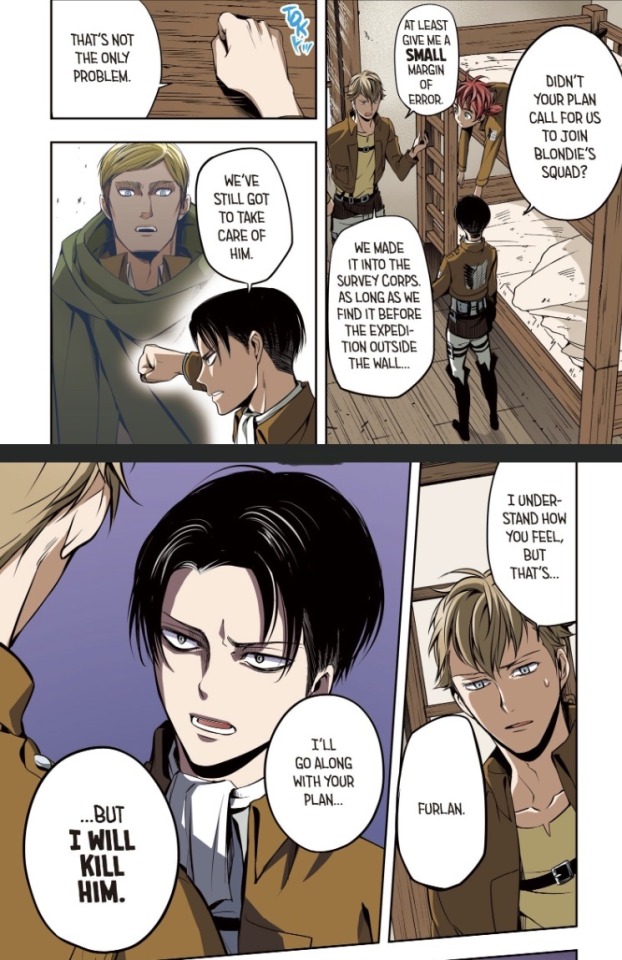
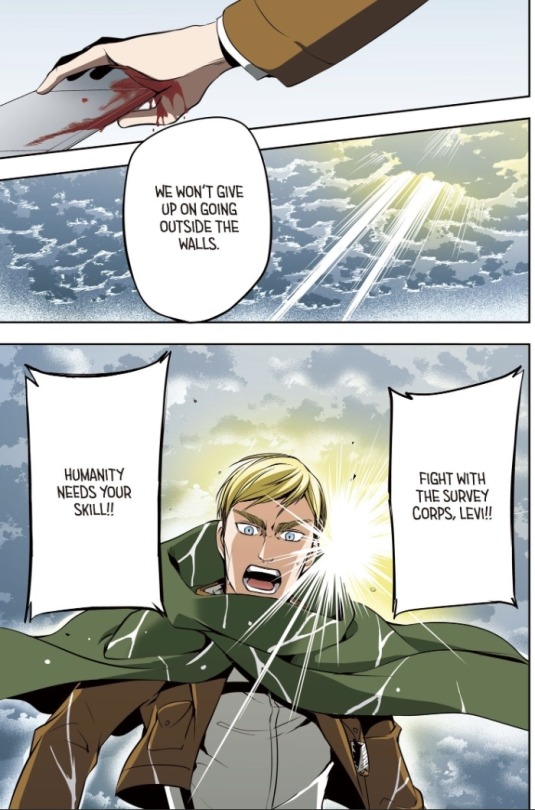
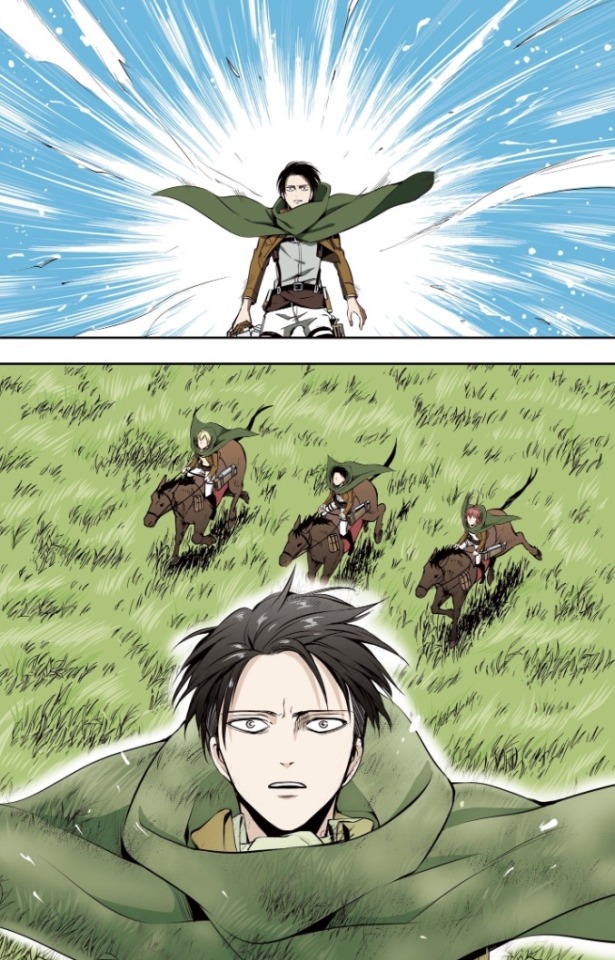
Erwin must’ve gleaned something from his conversation with levi in the castle, after his first Titan kill. that Levi was fascinated at the idea that he could protect others for a cause.
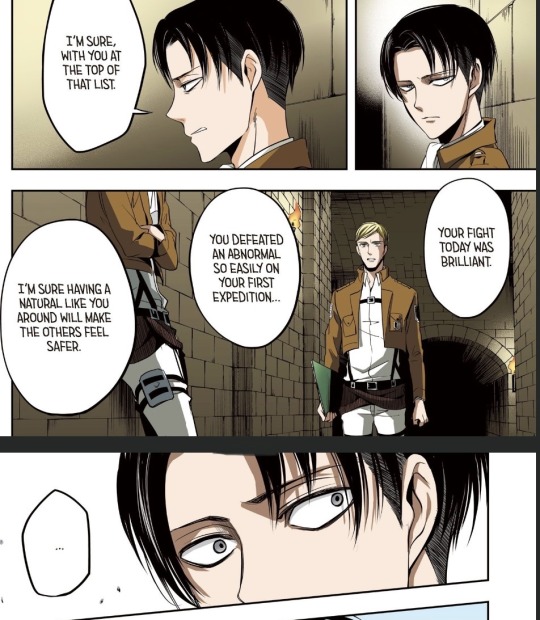
+
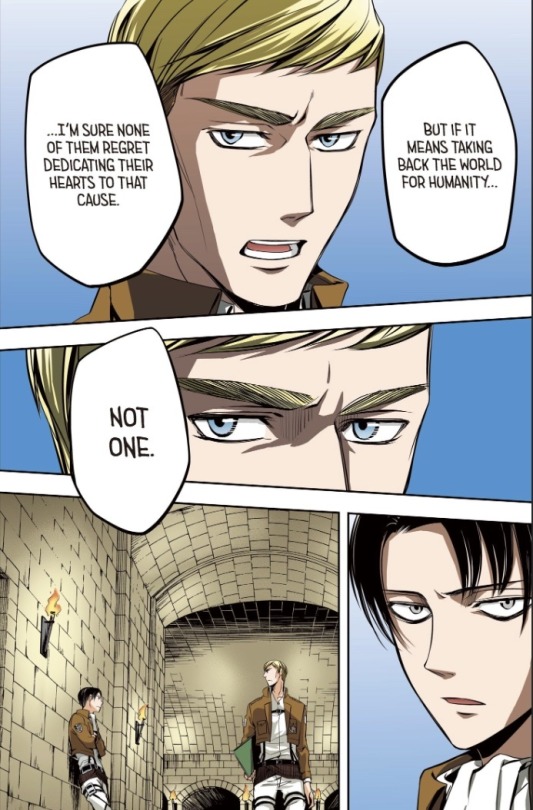
so in short, Erwin is a genius. he has the intelligence, strength, and charisma - and if not, he gains it - to ascend the ranks as well as keep himself alive.
because of Erwin’s actions and how he reacts to the consequences, it’s easy to conclude that he’s a shameless ego-maniac that believes, and will, do whatever he wants with no regard to anyone else.
that’s not it.
Erwin is universally loved by the entire survey corps in the present. for example in season 2 after Eren is kidnapped, and many are injured after the Colossal and Armored Titans appeared again. everyone appears comforted and in higher spirits when Erwin and his backup appears to assess the situation.
and it’s true. without Erwin’s leadership, the morale and the Survey Corps’ successes aren’t nearly what they are.
but in his conversation with Levi in season 3 part 1, Erwin sees himself as replaceable without a doubt. and that's only the tip of the iceberg.
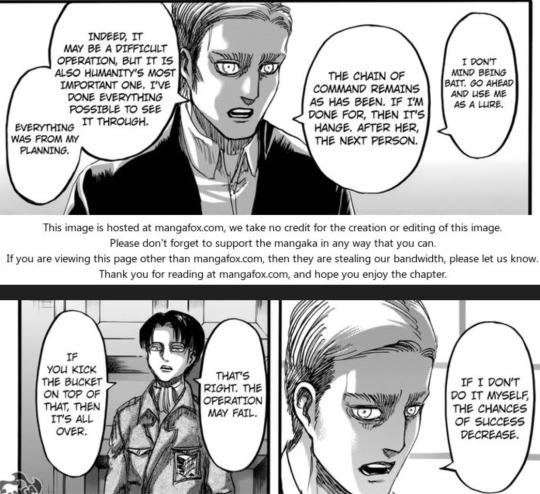
earlier in that season when Erwin is talking to Zachery, Erwin expresses that he doesn’t know if the coup is right, or whether it’ll just lead to suffering. he has plenty of doubts. he’s actuely aware that his actions are drastic, he holds lives in his hands that he has willingly let slip through his fingers for the sake of the truth.
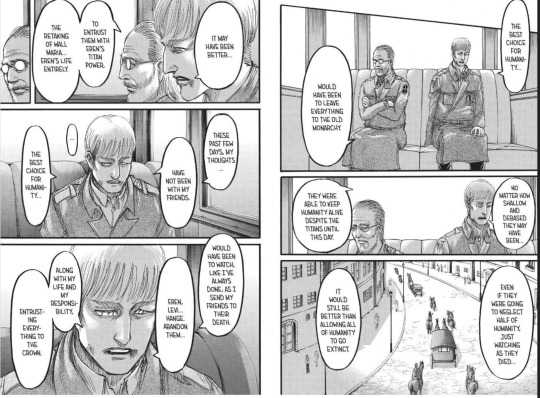
hell, he isn’t bothered when he wakes up with his arm missing. he will pay the rest of the price when he ‘ends up in hell’. it’s spoken like a joke, too, and after that, Levi helps to ease the tension. in his own way, he tries to make Erwin feel better by teasing him.

later in that scene, when Hange gravely shares their theory that the titans are actually human beings, Levi seems devastated and the mood is clearly solemn, but Erwin smiles. because this was proof that his father’s theories held water, that they’re one step closer to learning the origins of the Titans and the truth of their world.
while a village of people are either titanized or dead. yes, Erwin was extremely selfish in that moment. he is selfish, but he’s not heartless.
if you still have any doubts at all about that, just go and watch the entire crate scene(link). i won’t add screenshots because there’s simply too much to put lol.
Erwin’s guilt is endless. he confesses to Levi that he felt suicidal many times, but his motivation to keep going was for his father, and the truth. it’s a complex in his head that he dissects then and there: that all he’s done, he’s done for the sake of humanity, justice, of bringing freedom to everyone in a world safe from the titans.
but his intentions are also horribly selfish. at his core, he’s still a hapless child who just wants to see what’s in the basement. the truth.
in that monologue, Erwin’s self hatred is completely exposed. he feels that he tricked everyone, including Levi, into ignorantly joining his selfish ploy. that he’s irredeemable, and he deserves a fate even worse than death.
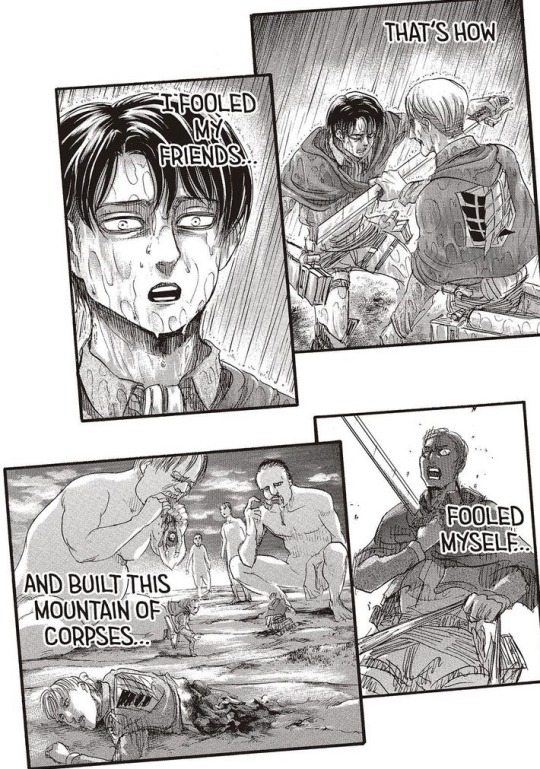
back in the hospital room, it’s canon and has been expanded upon that in that moment when Erwin smiled at the news that Levi realized that Erwin’s true intentions are selfish. but what did he do? he did what he’s always done ever since that fateful day in the storm. Levi learned that there’s a darkness within Erwin, but he still cares for him. even without an explanation, he feels that way. regardless of whether you see their relationship as romantic or not, Levi loved him and that’s undeniable.
back to the crate scene, after Erwin shared all of that with the extra visual of Erwin standing upon a mountain of corpses so high that the ground wasn’t visible underneath, Levi kneels and reassures him. “You have fought well. It's only thanks to you that we've come this far.” and he promises to kill the Beast Titan (furthermore, Levi’s devotion is clear in his obvious passion in season 4 to do just that).
but Erwin’s love for Levi is the same. Levi is also in the image beside Erwin’s father.
back in No Regrets, Erwin is outright smitten with Levi from the beginning when he first saw him using the ODM gear in the Underground. (i'm out of images i can add.. curse you tumblr.)
he needs him to join his cause. and he goes to great lengths to do just that.
Erwin knows that Levi is invaluable. for example in season 1 after Levi announces that he’s going back to his squad, Erwin stops him and makes him refuel his equipment when it was pointless. the truth is that after seeing what the Female Titan was capable of, the last thing Erwin was about to do was risk Levi’s life. ERWIN, the man who’s known for taking risks and making deadly gambles, won’t risk Levi’s life.
in season 3 part 2 the first idea Levi proposes is for everyone who’s still alive to escape on Eren while he fights the Beast Titan. Erwin immediately states that he won’t even get close to him and dismisses it. the most important battle of humanity (said Erwin), Erwin who has gotten countless comrades killed, committed so much sin, has shown himself to be incredibly selfish, would rather die without his life goal being completed than get Levi killed.
you could argue: well obviously not. in both those cases, Levi is in invaluable asset. he’s a tool. of course Erwin would take costly action to keep him alive.
but even if Levi did die to the Female Titan in season 1, Levi wasn’t needed for the operation in Stohess to succeed. in fact, he was injured. assumably he twisted his ankle, and Erwin put him out of commission for weeks. including during that battle against the Colossal and Armored titans, as far as they know the biggest threats to humanity. Levi wasn’t allowed because he had a minor injury. if Levi was just an important tool, Erwin would've gambled Levi's life on killing the Female Titan when he had the chance. Erwin would’ve had Levi join everyone else in rescuing Eren too.
Erwin wouldn’t be able to live with himself if Levi died under his orders. while Levi has expressed many times that even if Erwin were to lead them all into hell, he wouldn’t regret it for a second.
and in season 3 part 2, Erwin sacrifices himself (on top of scores of teenagers in classic Erwin fashion) in order for Levi to have a chance to succeed. for Levi to live, and for there to still be a hope of making a peaceful world.
with all this in mind, we have the tools to understand this promo image (god i'm such a loser).
Erwin’s conflict in season 3 part 2 is between finding the truth for his father’s sake no matter the cost, or continuing living for his duty’s sake symbolized by Levi. selfishly following his personal dream, selfishly pursuing the basement regardless of how many people die. or, selflessly bringing justice to his father’s murder by proving him right even if he can't be a part of it, selflessly leading the fight to finally bring back the hope and strength that Levi represents.
canonically, Levi is also Erwin’s last bastion of his humanity. without him, Erwin would have no qualms of acting like the monster Floch later portrays him to be. (i can add a link of proof later if anyone actually reads this lmao.)
Levi, and Erwin’s father are important to him. they give Erwin his reason to live in different ways.
this is represented by their positions on the poster. both of their profiles are visible, taking up the same amount of space in frame, both are looking back, presumably at Erwin with suggestive looks, as if waiting for Erwin to act.
specifically, let’s center in on Erwin’s father. he’s on the left, notably the side that Erwin lost his arm. this isn’t a coincidence. here, Erwin’s father represents his selfishness, even his suicidality (think back to Erwin’s comment about paying the rest of the price for his sins on hell while referring to his arm). to be succinct, Erwin’s father represents loss. and in a related meaning, he represents Erwin failing, and losing his life.
his father’s expression is different from Levi’s. his head isn’t turned towards him as much as Levi’s is, implying either a lack of confidence in Erwin, or that he isn’t supporting what he plans to do, and yet in his expression, he looks at him imploringly, worried. he’s asking for something. Erwin to stop all this self-torture? Erwin to bring justice to his death and find the truth about their world? pity? it’s not clear.
Levi is on the right. “his right hand man” right? (isayama is a genius by the way). Levi also appears to be in front of Erwin, but he’s looking back much more purposefully. he isn’t afraid, and he has no doubt. his brow is furrowed and he’s looking at Erwin pointedly, also expecting something from him, and that’s to lead him. Levi looks sure of himself, but he’s noticeably frowning, showing that he’s not completely confident. as well, Levi isn’t in uniform. actually his shirt and collar are that from no regrets when he met Erwin.
finally, Erwin. you don’t need to take more than a first glance to understand that he’s in turmoil. although most of his body is in frame, the perspective of the picture is from above him, while his father and Levi are at level with the viewer. as a result Erwin looks smaller, almost powerless. his cape billows behind him so that he isn’t shielded by it at all. symbolically, Erwin the man, and not Erwin the soldier, is being exposed here. one of the lapels of his jacket is blown aside, his commander’s necklace is strewn, and one of his legs appear to be raised as if in the middle of the motion to step back. his fist is loosely clenched by his side, further exuding his lack of confidence. he looks worried.
he’s worried about judgment from both Levi and his father. he has a choice to make that will undermine the other. he’s unsteady, and isn’t sure how to proceed.
this image literally says a thousand of words without saying anything. as i’ve explained, Erwin’s conflict between executing his father’s wish regardless of the consequences and who may die (including Levi, if Erwin were to agree to Levi's plan), or to fight valiantly in pursuit of a peaceful world with everything Levi represents: compassion, strength, sacrifice.
and of course, we know what he chose. he chose Levi. he gave up on his dream, this thing that gave Erwin the will to live, and willingly charged into a battle he knew he wouldn’t live through, let alone win.
even in near-death, coincidental or not, Erwin’s arm raising away from the syringe and his words - the question to his father in the classroom that started Erwin's whole journey - affected Levi’s choice. specifically, Levi recognized that Erwin’s dream was killing him from the inside, and it has all this time. he had become a slave to it like Kenny had. that is one of the reasons Levi let erwin rest, and erased all his burdens with death.
essay complete😈
#i had to reread midnight sun and erwin and levi's last conversations for this essay so i expect compensation for my upcoming therapy visits#/j#aot#aot manga#snk manga#aot official art#snk promo image#eruri#aot analysis#snk analysis#attack on titan manga#snk official art#snk levi#aot erwin#erwin smith#character analysis#erwin snk#erwin aot
147 notes
·
View notes
Text
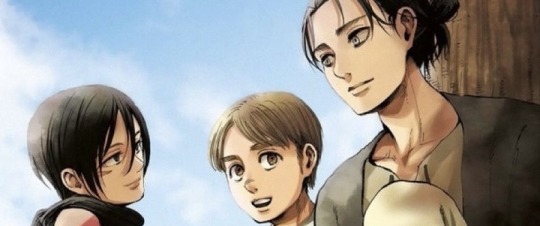
Eren + Forms of Love
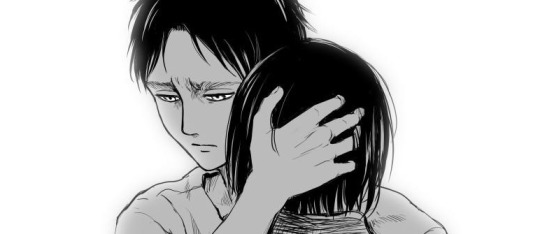
EreMika: Like waking up from a nap, realizing you’ve been allowed to snooze half the day away. The wordless understanding and support of family. A love often taken for granted in the moment, but deeply appreciated in retrospect. A lack of urgency from the sureness of fate that intertwines souls beyond mortality. Comfort.
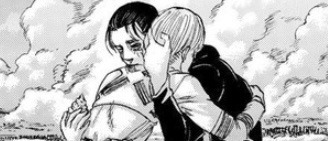
EreMin: Like being ripped awake from a nightmare so you no longer have to suffer. The confused, and desperate clinging to someone you trust for comfort and direction. A love necessary for survival. For growth. A repeated promise, firm and unwavering, that not even hellfire can cut through. Passion.
Both are needed.
#attack on titan#eren jaeger#shingeki no kyojin#snk#aot#eren yeager#eremin#eremika#eren x armin#eren x mikasa#Eren/armin#eren/mikasa#armin arlert#mikasa ackerman#aot analysis#Eren Yeager analysis#Eren jaeger analysis#attack on titan analysis
78 notes
·
View notes
Text
Losing my mind a little bit rewatching the final episode in dub…
I don’t think anyone talks enough about Annie and Mikasa right after Falco rescues the group.
Firstly, I absolutely love that Annie yells out to Mikasa as they swoop in- like things couldn’t be more dire, Mikasa is giving this badass speech and then Annie is just yells at her that she’s in the way with the same tone you would call out to someone who was blocking you on the sidewalk. Annie is honestly so funny sometimes and we don’t talk about it enough. And the okapi scene with them? Most levity in the entire finale arc in my opinion.
Most importantly to me though, when Levi makes the call that they need to split up and kill Eren and everyone is making their case as to why it hurts but they have to do it (Jean is the only one who apologizes to her, identifying that this is going to hurt her more than anyone else- but that’s a post in of itself) and Annie is the one who is able to prevent Mikasa from spiraling and get her back on track.
How?
Not by reasoning with her, or telling her to toughen up, or any of those heartless or logical things that we might be tempted to associate with Annie. Instead she tells her to focus on rescuing Armin and let the others worry about Eren.
This is interesting coming from Annie for a couple of reasons. Obviously it’s in her best interest to remind the group that Armin still needs rescuing since she cares for him and wants to focus on that herself. But I also think it matters that Annie is able to understand how to reach her. Mikasa wants more than anything to protect the people she loves- she can’t imagine ever harming them. By giving her something else to focus on, Annie is saving her from the hurt of thinking about Eren.
But not only that- Annie has been in her position.
Knowing she could die, that it would cost her the mission, that it was a betrayal of her other comrades (including Marcel who had already died)- knowing all of this, she was unable to kill Armin. On multiple occasions! Even without the bond of growing up with him such as in Mikasa’s case with Eren, the feelings she had for Armin wouldn’t allow her to hurt him.
Annie knows that she can’t possibly ask Mikasa to do something she wasn’t able to do. So she encourages her with a purpose that Annie herself can relate to. Fighting for the family she has left.
And there’s just something so touching and human about Annie’s ability to realize that in such a tense moment, and I don’t think we talk about it enough.
#annie leonhart#mikasa ackerman#eren yeager#jean kirstein#armin arlert#eremika#aruani#aruannie#aot#attack on titan#aot analysis
93 notes
·
View notes